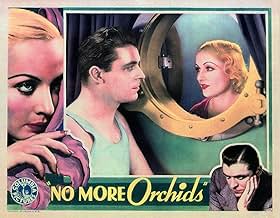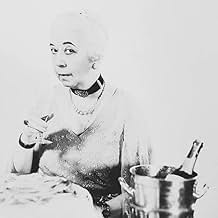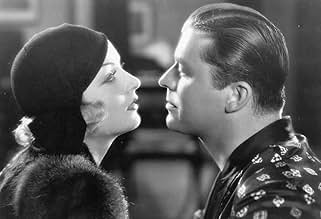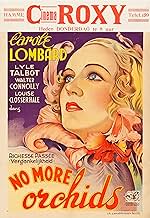Ajouter une intrigue dans votre langueAn heiress forced to marry into royalty in order to save her banker father falls in love with another man while on a cruise.An heiress forced to marry into royalty in order to save her banker father falls in love with another man while on a cruise.An heiress forced to marry into royalty in order to save her banker father falls in love with another man while on a cruise.
- Réalisation
- Scénario
- Casting principal
Sidney Bracey
- Holmes
- (non crédité)
Belle Johnstone
- Housekeeper
- (non crédité)
Edward LeSaint
- Capt. Jeffries
- (non crédité)
Wilfred Lucas
- Banker
- (non crédité)
Charles Hill Mailes
- Merriwell
- (non crédité)
Harold Minjir
- Modiste
- (non crédité)
Broderick O'Farrell
- Benton -- Butler
- (non crédité)
William Worthington
- Cannon
- (non crédité)
Avis à la une
No More Orchids (1932)
*** (out of 4)
Interesting, if a tad bit strange, drama about a rich brat (Carole Lombard) who falls in love with an average guy (Lyle Talbot) but her greedy grandfather (C. Aubrey Smith) forces her to marry a rich Prince so that her father will be saved from his debt. NO MORE ORCHIDS isn't a very well known film and even fans of Lombard seems to have never seen it. That's a shame because it turned out to be a pretty good gem even if the final ten-minutes are extremely bizarre and in the end they really don't work. The film benefits from a very strong screenplay as well as some strong performances. The actual story of this thing is the type of melodrama that had been going on throughout the silent era and would continue throughout the 30s as we have the bad girl falling for a good guy only to be forced into the arms of someone else. What makes it seem so fresh and original here is that the screenplay is smart enough to actually make for some nice dialogue scenes where everything plays out in a believable fashion. This includes several scenes of Lombard having to really think through her decision and this makes for some very good drama. The screenplay is smart enough to make her character more than just a single note and the viewer certainly benefits from this. Lombard does a very good job as she was perfectly capable of playing the brat side of this woman but we also believe her when the character slowly starts to change due to her feelings for Talbot. As for Talbot, he too turns in another winning performance as does Walter Connolly as the father and Louise Closser Hale nearly steals the film as the fast-talking grandma. Smith turns in his typical fine performance as well. Fans of pre-code will be happy to see some rather risky dialogue about Lombard not being a virgin and we even get a sequence where she takes her rob off and is standing around in her bra and panties. Not too shocking in today's age but this was 1932 after all. The film takes a rather obvious twist towards the end and I think what the father does, which I won't ruin, doesn't work at all. The screenplay tries to milk this sequence for everything it's worth but I felt it fell flat on its face and didn't pack the punch it was going for. Even so, NO MORE ORCHIDS is still a fine little film that deserves to be seen by more.
*** (out of 4)
Interesting, if a tad bit strange, drama about a rich brat (Carole Lombard) who falls in love with an average guy (Lyle Talbot) but her greedy grandfather (C. Aubrey Smith) forces her to marry a rich Prince so that her father will be saved from his debt. NO MORE ORCHIDS isn't a very well known film and even fans of Lombard seems to have never seen it. That's a shame because it turned out to be a pretty good gem even if the final ten-minutes are extremely bizarre and in the end they really don't work. The film benefits from a very strong screenplay as well as some strong performances. The actual story of this thing is the type of melodrama that had been going on throughout the silent era and would continue throughout the 30s as we have the bad girl falling for a good guy only to be forced into the arms of someone else. What makes it seem so fresh and original here is that the screenplay is smart enough to actually make for some nice dialogue scenes where everything plays out in a believable fashion. This includes several scenes of Lombard having to really think through her decision and this makes for some very good drama. The screenplay is smart enough to make her character more than just a single note and the viewer certainly benefits from this. Lombard does a very good job as she was perfectly capable of playing the brat side of this woman but we also believe her when the character slowly starts to change due to her feelings for Talbot. As for Talbot, he too turns in another winning performance as does Walter Connolly as the father and Louise Closser Hale nearly steals the film as the fast-talking grandma. Smith turns in his typical fine performance as well. Fans of pre-code will be happy to see some rather risky dialogue about Lombard not being a virgin and we even get a sequence where she takes her rob off and is standing around in her bra and panties. Not too shocking in today's age but this was 1932 after all. The film takes a rather obvious twist towards the end and I think what the father does, which I won't ruin, doesn't work at all. The screenplay tries to milk this sequence for everything it's worth but I felt it fell flat on its face and didn't pack the punch it was going for. Even so, NO MORE ORCHIDS is still a fine little film that deserves to be seen by more.
Spoiled rich girl (Carole Lombard) falls in love with poor boy (Lyle Talbot). But her father's financial troubles may force her to marry a wealthy prince. Pre-Code soaper features a scene of Carole Lombard in her underwear, which is as good a selling point as any. Carole's good in this and, of course, beautiful. Talbot does okay. Nice supporting cast. Louise Closser Hale is great as Carole's grandmother, Walter Connolly her extremely likable father, and C. Aubrey Smith fine in a villainous role. Enjoyable enough. It's not a bad movie of its type. Helps if you're a big fan of Lombard. The ending seems silly on paper but was surprisingly effective.
This is one of Carole Lombard's best early films. It goes a long way to sort of proving that it was Harry Cohn and Columbia Pictures, not the actress's home studio Paramount, that gave her the chance to shine most. The casting in this picture is flawless-- Lyle Talbot turns in a surprisingly good performance as the romantic interest and generates a lot of chemistry with Lombard; C. Aubrey Smith is letter-perfect in his villainous role as the tyrannical grandfather; and both Louise Closser Hale as the charming grandmother and Walter Connolly as the financially- troubled father give the story its heart and soul. Even the smaller roles (the catty rival, and the European prince) are filled by capable performers. But it's the story that captivates the viewer. An opposites-attract romance, it combines elements of comedy and melodrama, moves briskly and is very entertaining. For a product from a then-poverty row studio, this Columbia Pictures release is as sharp and polished as anything that came out of MGM or Paramount at this time. Highly recommended and worth seeing!
NO MORE ORCHIDS is just a little programmer movie but it's an incredibly elegant one. Columbia studios in the early 1930's was thought of as something as a poverty row studio yet this film looks as slick and expensive as any potboiler the more uptown MGM or Paramount might have produced.
Carole Lombard stars as a spoiled society girl who is engaged to a prince in a marriage arranged by her controlling grandfather C. Aubrey Smith. On the ocean-liner back to America, she falls in love with white collar worker Lyle Talbot (who in her pampered world qualifies as "penniless") and eventually breaks his cool barrier. Lombard's pal of a dad, Walter Connally, and paternal grandmother Louise Closser Hale are crazy about Talbot but mean old grandpa Smith is not about to let his plans fall through, having seen his own late daughter marry "beneath" her.
Carole Lombard is superb as the frivolous but good-hearted socialite and she surprisingly is matched by Lyle Talbot, one of the era's reliable but usually bland leading men; in this picture, Talbot exhibits a sex appeal seldom tapped in the scores of bread-and-butter pictures he cranked out. Connally is very good in one of his first movie roles as father to a screwball romantic comedy queen (although this picture ventures more toward soap opera "women's picture" despite some nice comedy bits). Talented character player Louise Closser Hale seems a bit miscast, she's a bit too cutesy and lacks the saltiness a May Robson might have brought to the part. Smith essays a rare villainous part in a rather brief but pivotal role. Ruthelma Stevens and the very cute Allen Stevens have the only other somewhat featured parts as two of Lombard's good-time buddies in the society crowd; these small parts are among the larger ones for each of them, as they generally played bits.
Lombard is so strikingly beautiful and assured in her performance here it's hard to believe she was little more than a starlet at the time and not yet a major Hollywood star. She is sensationally photographed, although one scene makes her facial scar from an early car wreck more visible than I've ever seen it in one of her films. NO MORE ORCHIDS is just another Hollywood movie but it moves quickly and smoothly and is well worth your time if you love films from the 1930's.
Carole Lombard stars as a spoiled society girl who is engaged to a prince in a marriage arranged by her controlling grandfather C. Aubrey Smith. On the ocean-liner back to America, she falls in love with white collar worker Lyle Talbot (who in her pampered world qualifies as "penniless") and eventually breaks his cool barrier. Lombard's pal of a dad, Walter Connally, and paternal grandmother Louise Closser Hale are crazy about Talbot but mean old grandpa Smith is not about to let his plans fall through, having seen his own late daughter marry "beneath" her.
Carole Lombard is superb as the frivolous but good-hearted socialite and she surprisingly is matched by Lyle Talbot, one of the era's reliable but usually bland leading men; in this picture, Talbot exhibits a sex appeal seldom tapped in the scores of bread-and-butter pictures he cranked out. Connally is very good in one of his first movie roles as father to a screwball romantic comedy queen (although this picture ventures more toward soap opera "women's picture" despite some nice comedy bits). Talented character player Louise Closser Hale seems a bit miscast, she's a bit too cutesy and lacks the saltiness a May Robson might have brought to the part. Smith essays a rare villainous part in a rather brief but pivotal role. Ruthelma Stevens and the very cute Allen Stevens have the only other somewhat featured parts as two of Lombard's good-time buddies in the society crowd; these small parts are among the larger ones for each of them, as they generally played bits.
Lombard is so strikingly beautiful and assured in her performance here it's hard to believe she was little more than a starlet at the time and not yet a major Hollywood star. She is sensationally photographed, although one scene makes her facial scar from an early car wreck more visible than I've ever seen it in one of her films. NO MORE ORCHIDS is just another Hollywood movie but it moves quickly and smoothly and is well worth your time if you love films from the 1930's.
Carole Lombard is spoiled heiress Annie Holt - in the '30s, it seems like everyone was writing about spoiled heiresses. Anyway, she's engaged to a prince, but while on a cruise, she falls for Tony Gage (Lyle Talbot). He has no money, isn't impressed by hers, and pays no attention to her. He ultimately tells her that her values are shallow and he doesn't respect her. Lombard cleans up her act and the two fall in love.
This is a bit of a sticky wicket - Annie's father (Walter Connolly) is in financial trouble and is planning on this marriage to help him out. And Annie's grandfather (C. Aubrey Smith), who set up this royal marriage, is looking forward to it as well. Put it this way - if she doesn't marry this guy, daddy's going to jail.
Good movie because of the wonderful cast, though the ending is a little bit of a downer. Lombard is gorgeous. She was a gal who could really turn a phrase. I wish that I could have met Lyle Talbot when he was alive - in a 56 year film career, he worked with everyone. The stories he could have told of his experiences in film, on stage, and on TV, where he did two series at one time.
Walter Connolly was a wonderful and sympathetic actor who died way too young, but he certainly made his mark. C. Aubrey Smith did an excellent job being mean as dirt, and Louise Closser Hale did a good job as the no-holds-barred grandmother.
A good film to watch but sad, too, to think that Lombard died so young. She was a true star, beautiful, radiant, funny, warm, and above all, an excellent actress. Always worth watching.
This is a bit of a sticky wicket - Annie's father (Walter Connolly) is in financial trouble and is planning on this marriage to help him out. And Annie's grandfather (C. Aubrey Smith), who set up this royal marriage, is looking forward to it as well. Put it this way - if she doesn't marry this guy, daddy's going to jail.
Good movie because of the wonderful cast, though the ending is a little bit of a downer. Lombard is gorgeous. She was a gal who could really turn a phrase. I wish that I could have met Lyle Talbot when he was alive - in a 56 year film career, he worked with everyone. The stories he could have told of his experiences in film, on stage, and on TV, where he did two series at one time.
Walter Connolly was a wonderful and sympathetic actor who died way too young, but he certainly made his mark. C. Aubrey Smith did an excellent job being mean as dirt, and Louise Closser Hale did a good job as the no-holds-barred grandmother.
A good film to watch but sad, too, to think that Lombard died so young. She was a true star, beautiful, radiant, funny, warm, and above all, an excellent actress. Always worth watching.
Le saviez-vous
- AnecdotesWalter Connolly (Bill Holt) and Jameson Thomas (Prince Carlos) would again play a father and his prospective son-in-law in New York - Miami (1934).
- Gaffes(at about 6 mins) When Anne Holt is told to take off her dress, she is clearly not wearing a bra. Two edits (six seconds) later, Anne is seemingly struggling to pull her dress below her hips while wearing a bra, which she would not have had time to put on while simultaneously removing her dress.
- ConnexionsReferences Une pauvre petite fille riche (1917)
Meilleurs choix
Connectez-vous pour évaluer et suivre la liste de favoris afin de recevoir des recommandations personnalisées
- How long is No More Orchids?Alimenté par Alexa
Détails
- Date de sortie
- Pays d’origine
- Langue
- Aussi connu sous le nom de
- Richesse perdue
- Lieux de tournage
- Wall Street, Manhattan, Ville de New York, New York, États-Unis(establishing shot for the Banker's Club scene)
- Société de production
- Voir plus de crédits d'entreprise sur IMDbPro
- Durée1 heure 18 minutes
- Couleur
- Rapport de forme
- 1.37 : 1
Contribuer à cette page
Suggérer une modification ou ajouter du contenu manquant

Lacune principale
By what name was Echec au prince (1932) officially released in Canada in English?
Répondre




































